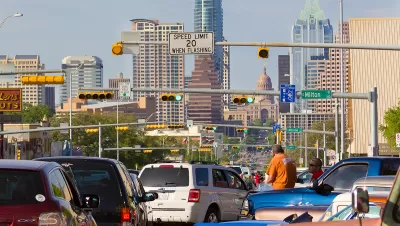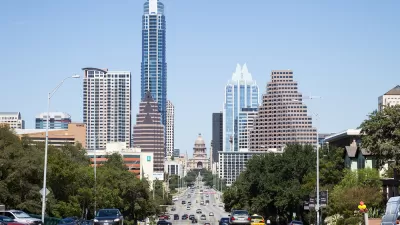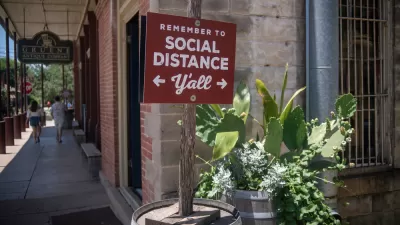The city of Austin's political leadership has proposed a package of competing bond proposals to raise money for large congestion relief measures in the fast-growing city.

An editorial by Alberta Philips explores some of the rhetoric behind a recent $720 billion bond proposal for the city of Austin, championed by Mayor Steve Adler. The editorial mostly digs into the scope of the bond, proposed to overhaul "key traffic corridors" in and around the city.
When he announced the $720 million bond package at the end of May, according to Philips, Mayor Adler claimed it was "time to 'go big or go home.'" The bond backs up that big talk by providing funding for the so-called Smart Corridor initiative. Philips also identifies a proposal by State Senator Kirk Watson to overhaul Interstate 35 as another example of the big thinking that presents "a remarkable opportunity to do something about their transportation predicament."
Philips's argument holds off on defining how the city should build bigger to solve Austin's congestion woes—first arguing that competing bond proposals by Austin city councilmembers are "too small to get the job done." One proposal, supported by City Councilmember Ann Kitchen and the city's mobility committee, would raise $300 million. City Councilmember Greg Casar backs another bond proposal that would spend $720 million, but has a "too small geographical reach and vision," according to Philips.
Only at the end of the editorial does Philips lay out the vision of what building bigger should look like, revealing a multi-modal, technology-enabled streetscape.
FULL STORY: Mayor says go big on transportation, but colleagues go small

Alabama: Trump Terminates Settlements for Black Communities Harmed By Raw Sewage
Trump deemed the landmark civil rights agreement “illegal DEI and environmental justice policy.”

Study: Maui’s Plan to Convert Vacation Rentals to Long-Term Housing Could Cause Nearly $1 Billion Economic Loss
The plan would reduce visitor accommodation by 25% resulting in 1,900 jobs lost.

Planetizen Federal Action Tracker
A weekly monitor of how Trump’s orders and actions are impacting planners and planning in America.

Waymo Gets Permission to Map SF’s Market Street
If allowed to operate on the traffic-restricted street, Waymo’s autonomous taxis would have a leg up over ride-hailing competitors — and counter the city’s efforts to grow bike and pedestrian on the thoroughfare.

Parklet Symposium Highlights the Success of Shared Spaces
Parklets got a boost during the Covid-19 pandemic, when the concept was translated to outdoor dining programs that offered restaurants a lifeline during the shutdown.

Federal Homelessness Agency Places Entire Staff on Leave
The U.S. Interagency Council on Homelessness is the only federal agency dedicated to preventing and ending homelessness.
Urban Design for Planners 1: Software Tools
This six-course series explores essential urban design concepts using open source software and equips planners with the tools they need to participate fully in the urban design process.
Planning for Universal Design
Learn the tools for implementing Universal Design in planning regulations.
Caltrans
Smith Gee Studio
Institute for Housing and Urban Development Studies (IHS)
City of Grandview
Harvard GSD Executive Education
Toledo-Lucas County Plan Commissions
Salt Lake City
NYU Wagner Graduate School of Public Service




























